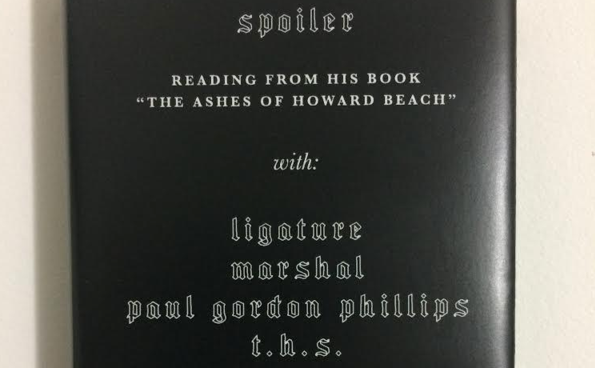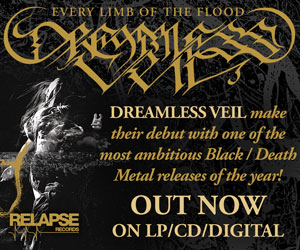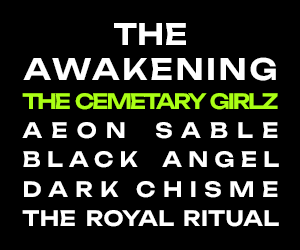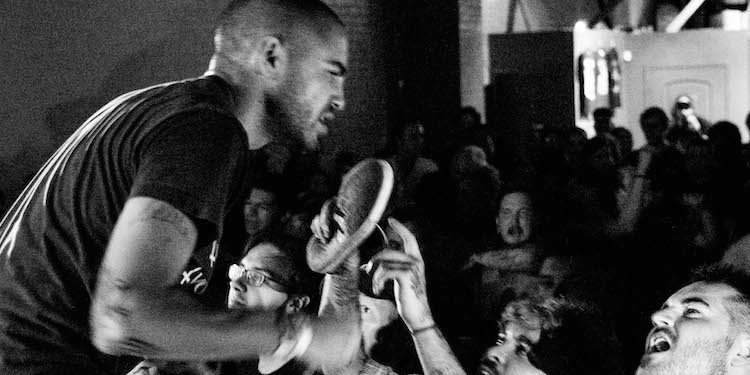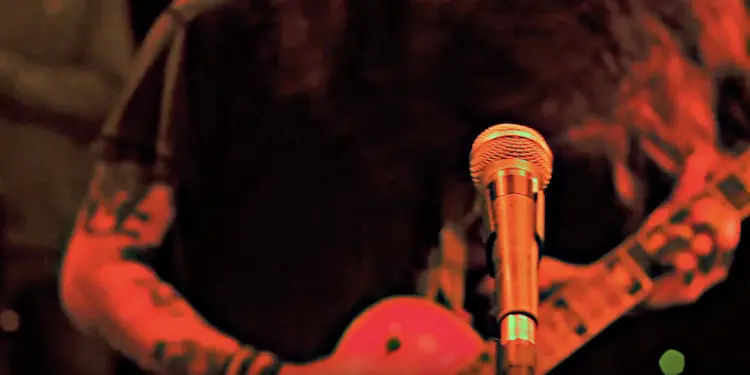Permanent Sleep is a very interesting small publishing press based out of Toronto, Ontario that focuses on releasing radical shit in many different forms! They have just released the second pressing of Spoilers book ‘The Ashes of Howard Beach’. To celebrate the second edition, they have also released a cassette tape featuring ten collaborations with Spoiler preforming readings from the book alongside performances by Ligature, Maniac Cop (Ascetic House), Jesse Sanes, Paul Gordon Phillips, Marshal, T.H.S., J.S. Aurelius (Ascetic House), Harmaline, and Anthony Pasquarosa. Today CVLT Nation is stoked to be sharing the track from our comrade J.S. Aurelius (Ascetic House) entitled “URN.” When I see projects like this one, it makes me feel like Punk will never die, it just takes different forms! Check out this killer Interview with Spoiler by Dan Darrah:
Before getting into the guts of The Ashes of Howard Beach, I was hoping we could talk about the background of your writing career. Your visual art is well-known in hardcore and punk music spheres, almost to the point of cult status, displayed on records and merchandise from bands like Iron Boots, Loud and Clear, Cro-Mags, Backtrack, and a band you were a former member of, Justice. Where does your art come into play with your writing? Are there similarities, overlaps, relationships between those two mediums?
On the surface, my illustrations and my writing don’t have much to do with each other. They stem from different parts of the brain, and appeal to different sensibilities. Underneath the surface, I’d say my work portrays a sense of controlled chaos, regardless of medium. It’s often grotesque, bordering on the absurd, but always with an underlying sense of structure.
Can you illustrate some of your writing habits?
If I’m writing poetry or poetic prose, I rarely have a preset notion of what I want to end up with. I start forming the first sentences in my head, and if I like them enough, I’ll start typing to see how far the idea could go. Sometimes it’s a moment of inspiration, other times it feels more like vomiting. Something uncomfortable comes up in me and needs to get out.
What initially drove you to write?
At around twelve years old, I started writing long letters. That summer, my best friend and I had gotten in some trouble with the police, and his parents wouldn’t let me see him. I was a metalhead from the low income part of town, so I wasn’t exactly popular with parents. I was confined to my room with my older brothers records and metal mags, reading every word down to the personal ads in the back, which was still a thing at the time. I’d been so bored and lonely I placed a free ad and started getting mail. It got me through, and I kept in touch with a few people after school started up. One girl in particular had an ongoing competition with me to see who could write the longest letter. I made it to fifty pages. I was entering puberty, experiencing all these new, weird, horrible feelings, and I learned to express them through the written word.
How have these habits changed since the beginning of your writing career? Similarly, can you chart the ways in which your content has changed or “matured,” so to speak, over time?
I soon got into Punk and Hardcore, immediately started writing and reading zines, and when I graduated to reading novels, I was embarrassed to realize I read much slower than my friends. I avoided the topic of literature because of it, but eventually realized that my slow reading had its benefits. It allowed me to fully absorb and appreciate the details of the writing, it gave me time to appreciate the subtleness of the phrasing, the rhythms and layers of meaning in texts. I began to integrate that mindset into my own writing, paying attention to my own natural rhythms and phrasing. Coming from a background of writing punk zines, it took me years to stop overusing sarcasm as a protective layer. I was always very sardonic in my writing, but over time I’ve tried to combine that with a kind of brutal honesty.
Can you outline some of the origins of Howard Beach – in its gritty honesty – over the 5-year period of 2010-2015? Where did you derive inspiration from (whether it be personal events, others writers)?
Inspiration came in equal parts from the authors I was reading at the time, and the aftermath of personal events I had stewing in the back of my mind. I divorced the only person I’d ever dated, and broke a thirteen year streak of sobriety. Then came the ten year anniversary of leaving behind my homeland, and the fifteen year anniversary of last speaking to my father. All of this forced a great deal of reflection on my upbringing and relationships, all while entering a completely new post-divorce life. These processes brought up ugly parts of myself that I never knew were there, and I wanted to get them out into writing rather than into my actions. I was writing song lyrics at the time, and this all pushed me towards poetry, with a much more honest and raw approach. I never thought I would publish any of it, but I needed to write it.
Instead of attempting to downplay the raw feelings that came out in my writing, I began to exaggerate them through loose ideas for characters, allowing an open-ended and free exploration of the ugliest parts of myself and how they related to the truly vile characters that existed in real life. I started to explore ugliness as a concept, not just my own, but looking at the things that cause people to be ugly to each other.
As for literary influence, I was getting very deeply into Burroughs, particularly Naked Lunch, in the first few years of writing Howard Beach. I think some of that deranged, poetic Beat prose shines through in my earlier pieces, blended with the influence of Flemish authors I grew up with, like the death-themed poetry of Jotie T’Hooft and the dry, cynical or absurdist humour of Willem Elsschot or Herman Brusselmans. When the book was nearly completed, a friend read the transcript and pointed out similarities to Karen Finley’s Shock Treatment, which I found striking. Most of these authors are deeply funny to me, despite their very serious content, and I think that encouraged me to keep writing the way I do. I think there’s a lot of humour in my book, which seems to go unnoticed, and I find that even funnier ― telling a joke that no one gets.
Who is Howard Beach, and in what ways does he manifest throughout the book?
The Howard Beach persona is based on song lyrics that I misinterpreted in my youth. The Krakdown song “Ignorance” on the NYC Hardcore: The Way It Is compilation from 1988 speaks out against racism and mentions Howard Beach in the lyrics. Upon first hearing this as a fifteen year-old in Belgium with no frame of reference, I thought Howard Beach was a person being directly called a racist. I soon started noticing more references to Howard Beach in NYHC music, and found out it was a place, which mystified me even more. What happened in Howard Beach?
The influence of that album was fundamental in shaping my young life. The Krakdown song and many others like it allowed me to think outside of my surroundings and upbringing. My father was a blatant racist, and I resented him for it. We were a family of white trash long hairs, and at fifteen I cut all my hair off, marking myself as separate from them. Getting into Punk and Hardcore allowed me to see a world outside of the narrow, small-minded trappings of my family life. Within a few years I’d leave for good.
In 2013, I ended up sitting at the Howard Beach subway station. The Krakdown song started to play in my head, and I reflected on my youth, thinking how far removed I was from that life. I tried to picture what I would have been like if I never left. Looking out at Howard Beach, I thought about the similarities – I’d long known that this place was referenced in so many anti-racism songs of eighties New York because of the fatal hate crime committed there in 1986, which heightened racial tension in NYC. I also knew not much had changed in Howard Beach: similar crimes were committed there as recent as 2005.
I remembered how I’d once thought of Howard Beach as a person, and the idea stuck. I had already begun writing parts of the book, and I used the Howard Beach character to tie all of these ugly pieces together, with Howard acting as an alter ego for the person I could have become, had I not broken out of my surroundings as a teenager. I understood the difficult history of Howard Beach as a place of internal conflict, of ignorance passed down through generations, and I attributed these characteristics to Howard, the person.
I channeled the complexities of my own negative personality traits into Howard so that I could approach a despicable character with a sense of understanding. I wanted to take an honest look at Howard, without making him a simplistic villain. I tried to erase the lines between the traditional sense of good and evil by creating a well-intentioned, but ignorant human character that one could relate to, despite all of his ugliness.
Book available at Deathwish & Here.
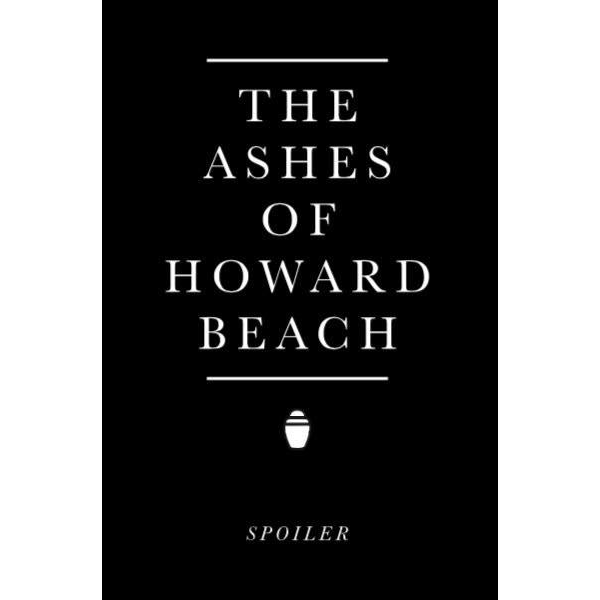
Having read the book twice now, it seems clear to me that it’s no simple conglomeration of your work thrown together messily. It is unified; it presents a sense of togetherness. Can you explain what exactly unites this collection – thematically or otherwise – and how?
The binding theme of the book is an examination of ugliness, in the mental and spiritual sense, explored through the Beach family with Howard as the main character. The book is set up so that all individual pieces can stand on their own, but work together to create a larger whole. Some of the pieces have only a loose connection to others, much like the family members themselves. As you read more pieces, more meaning can be found in each piece, adding to the larger story.
The varying styles of writing are attributed to the members of the family, each with their own characteristics and inner monologues. Each character has their own view of life, which often conflicts with those of their relatives. Some of them openly despise one another, but they are bonded by their shared trauma. The Beaches have lived through generations of unusually violent deaths in the family, which most members were not able to process or move past. Their search for relief from pain has brought many of them to ugly places and made them into ugly characters, and even the few that managed to heal from the trauma often seek beauty in misguided ways.
The book’s thematic and symbolic strength, in my eyes, begs some exploration, if you don’t mind. For example, Back Road and Apple Tree appear to illustrate a sort of rudderless, starry-eyed youthfulness. There is a sense of urgency, a feeling of it soon being lost: “Be dumb,” you write, “Be young, and die before anyone can ever make you feel like what you did was wrong.” If this is a correct characterization, can you talk about that feeling? Is this kind of joy transitory, temporary?
In a sense, I think I was reflecting on my own age in both of those pieces, as I was entering my thirties and didn’t feel ready for it at all. I had cut short my youth by marrying young. After my divorce I was both celebrating my newfound freedom and fearing that it was already too late for me. The expressed idea, of living carelessly and dying before you can reflect on your life choices or be held accountable for them, is of course very irresponsible and perhaps immature, though tempting and liberating in times of distress. The sense of joy you receive from this lifestyle only lasts until you need meaning and purpose again, but everyone experiences phases in life where loosening your grip and allowing yourself to feel rudderless is as important as knowing where to go, and therefor even a transitory joy can be important in navigating life.
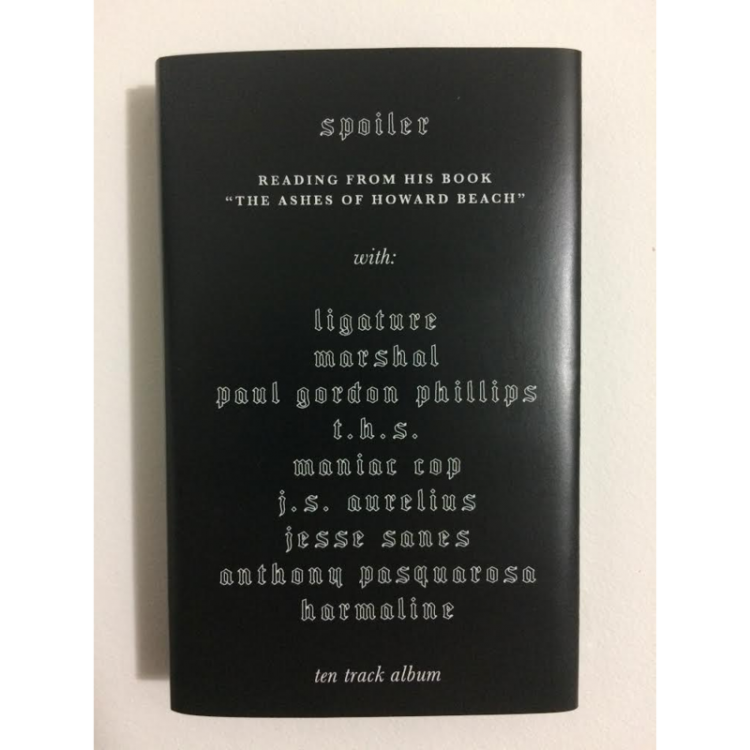
“I don’t care if my work projects don’t make their deadline. They’re not mine and I don’t care about them,” the narrator says to himself in Riding in a Car with Hitler. He’s jealous of Hitler’s impetus; his “projects” and his obsessive compulsion to complete them – why is that?
I wanted to have a character showing the earliest signs of being interested in Nazism. I used an absurdly light-hearted tone for the piece because I didn’t want to approach the topic from the perspective of a hardened Nazi. I wanted to show that most people are not born Nazis. I wanted to look at a common worker, maybe one of the Beach brothers, who’s thinking about Hitler in his most private headspace, simply viewing him as a powerful, hardworking man. I made it purposely unclear wether the narrator is genuinely flirting with modern day Nazism, whether he is merely a disgruntled worker experiencing a rather strange day dream, or if he is actually mocking Hitler and calling himself too lazy to be a Nazi. That type of open-ended ambiguity is used throughout the book.
I wrote this piece in 2010. Publishing the book in August of 2016, I had no idea how topical this discussion would soon become. I knew that fascist and white supremacist groups were on the rise, but still thought they were mostly confined to the underground. One year later, my writing seems almost intentionally geared towards the political climate of 2017.
Explain why you reduced motivations, relationships, and life itself to shapes, limbs – raw, impersonal objects – in Holes and All Fours.
These pieces reflect inner monologues from characters overwhelmed by pain, seeking to reduce the complexities of life to basic form, to a simple formula, which makes life more manageable but essentially meaningless. I wrote the pieces through a depression. I was personally overwhelmed with life, and it seemed to help reducing everything happening to me into something I could figure out. Of course, this only caused more hardship, because life is complex whether you like it or not. In a way, these pieces were exercises in attempting to understand people who adopt strict, boxed-in ideologies in order to mask or subvert their pain, and get sucked into a narrowing cycle.
In what ways have your stories examined coping – or, perhaps just life post-death? I am thinking to Urn, The New Age, and The Fastest Worm. How is it characterized? How do you personally view it?
There is an arc in the loose narrative of the book, showing the different phases of dealing with death. The first piece “Back Road” serves as a kind of invitation to living dangerously, and presents death as a positive outcome. In the second piece, “The New Age”, we learn how deeply impacted the Beach family was by the death of Howard’s mother. There is an almost cartoonish absurdity to her death (eaten alive by a bear at the zoo), so at this point in the arc, death is still treated as a mere fact, a story ― this death has not been processed. We see that this ignored death clearly affects the choices Howard and his family make in life, and these choices are often just as darkly humorous as the death itself (Howard becomes a taxidermist, his father a zoo keeper).
The following piece “Urn” refers to the ashes of sublimation, ie. the act of diverting an ugly impulse into a more acceptable activity. This shows that the character of Howard Beach is also a sort of metaphor for the concept of sublimation, and the arrival of his ashes mean that sublimation is now dead: all further writing will not employ sublimation, but will show the raw impulses of each character struggling to process death. The arc continues throughout the book, showing various ways of interpreting and dealing with the meaningless deaths of soldiers, the mourning of family members, etc. The only death that goes unexamined is that of Howard Beach himself, which despite the title of the book, is mentioned only in passing. These pieces are, to an extent, all acts of sublimation by myself as the author, and in many ways the book is a complex ritualistic celebration of the death of the ugliest parts of myself via sublimation.
As it stands now, what does the future look like for you? Are you getting pen back on paper?
I’ve taken a break from poetry in the last year to finish a few lengthy articles, and am hoping to finish a music history book I’ve been working on for a few years called New York Rippers, focusing on the late seventies and early eighties punk scene in NYC as it morphed into early Hardcore. I do have a collection of unreleased poetry that I’m looking to flesh out, and I have an endless supply of ideas floating around in my head for books, zines and other writing projects. I’ve got a lot of work to do.

